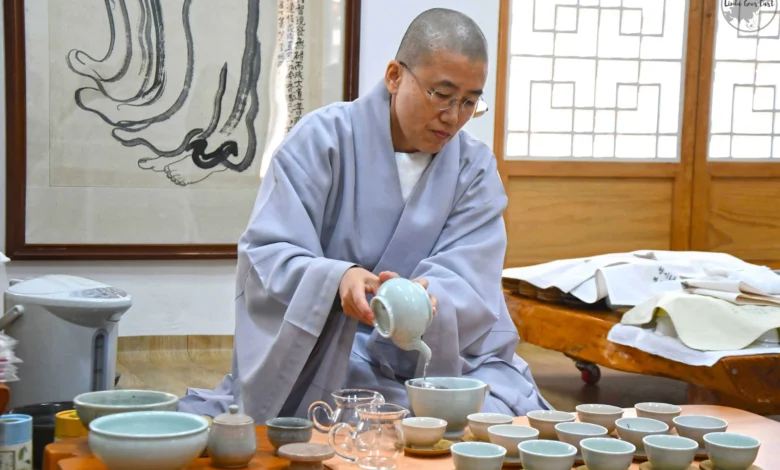
10 Interesting Facts About Korean Tea Ceremonies In 2023? Korean tea ceremonies continue to captivate people with their unique blend of tradition, culture, and tranquility. Rooted in ancient customs, these ceremonies have evolved over centuries to become an integral part of Korean heritage. This article explores ten fascinating facts about Korean tea ceremonies, shedding light on their significance and impact in modern times.
Historical Origins of Korean Tea Ceremonies
Korean tea ceremonies trace their roots back to the 7th century when tea culture was introduced to Korea from China. Initially, tea was seen as a medicinal drink, but over time, it became a symbol of hospitality, respect, and social bonding.
Two Major Tea Varieties
In Korean tea ceremonies, two primary tea varieties take center stage – green tea (nokcha) and fermented tea (hongcha). Green tea is commonly served in formal ceremonies, while fermented tea is favored for its deep, earthy flavors in more casual settings.
The Role of Traditional Korean Tea Houses
Traditional Korean tea houses, known as “chatjip,” play a pivotal role in preserving and promoting tea culture. These serene spaces offer a respite from the bustling city life, providing visitors with a peaceful ambiance to enjoy tea and engage in meaningful conversations.
Importance of Tea Etiquette
Korean tea ceremonies adhere to strict etiquette, emphasizing respect and humility. Participants are expected to bow before receiving or presenting tea, and they must hold the cup with both hands as a gesture of gratitude.
Meditation and Mindfulness
Korean tea ceremonies transcend the mere act of drinking tea; they are a form of meditation and mindfulness. The serene environment, coupled with the aroma and taste of tea, allows participants to connect with their inner selves and find tranquility.
Read More; Top 10 Tips Halloween Costume Party In 2023
The Art of Tea Ware
Tea ware holds great significance in Korean tea ceremonies. Each piece, from the teapot to the cups, is carefully selected to enhance the tea-drinking experience. Artisans often handcraft these delicate pieces, making them unique works of art.
Seasons and Tea Selection
Tea selection in Korean tea ceremonies is influenced by the seasons. Certain teas are preferred during specific times of the year, such as green tea in spring and barley tea in summer, allowing participants to savor the flavors of each season.
The Resurgence of Tea Culture
In recent years, there has been a resurgence of interest in Korean tea ceremonies. As people seek solace in tradition amid a fast-paced world, the meditative qualities of these ceremonies have gained popularity among both locals and tourists.
Modern Innovations in Tea Ceremonies
While Korean tea ceremonies honor age-old customs, modern innovations have also found their way into the practice. Some tea houses now offer interactive tea ceremonies with digital guides, allowing visitors to learn about the process in a technologically enhanced way.
Global Influence and Fusion
Korean tea ceremonies have transcended borders, capturing the attention of tea enthusiasts worldwide. As the interest in Korean culture grows globally, tea ceremonies have also integrated elements from other tea traditions, creating unique and exciting fusions.
Conclusion
Korean tea ceremonies in 2023 continue to embody the essence of Korean culture and offer a serene escape from the modern world. The balance of tradition and innovation has allowed these ceremonies to remain relevant while still preserving their historical roots. Whether you are a tea connoisseur or simply curious about cultural practices, a Korean tea ceremony is an experience that will leave you feeling enlightened and rejuvenated.
FAQs
Q: Are Korean tea ceremonies only for locals?
A: No, Korean tea ceremonies welcome visitors from all around the world who wish to experience this unique cultural tradition.
Q: Can I participate in a Korean tea ceremony as a beginner?
A: Yes, beginners are warmly welcomed in Korean tea ceremonies, and hosts are happy to guide participants through the process.
Q: Are there any health benefits associated with Korean tea ceremonies?
A: Yes, Korean tea is believed to have numerous health benefits, including improved digestion and reduced stress levels.
Q: What is the best time to visit a traditional Korean tea house?
A: Any time of the year is suitable for visiting a Korean tea house, but the experience may differ based on the season.
Q: Can I purchase Korean tea and tea ware outside of Korea?
A: Yes, Korean tea and tea ware are available for purchase online and in specialty stores worldwide.











